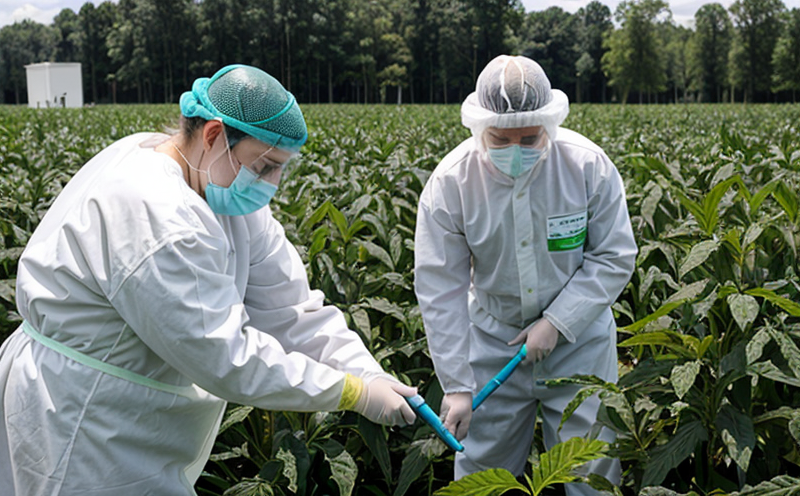EN 16640 Plant Growth-Promoting Rhizobacteria Testing
The EN 16640 standard provides a standardized method for the testing of plant growth-promoting rhizobacteria (PGPR). This testing ensures that PGPR products meet specific criteria, thereby providing assurance to stakeholders involved in agricultural practices. Quality managers and compliance officers rely on this service to ensure the reliability and effectiveness of their biocontrol agents and beneficial microorganisms.
Plant Growth-Promoting Rhizobacteria are a diverse group of bacteria that colonize plant roots and promote growth by enhancing nutrient uptake, stimulating root development, or even producing phytohormones. The EN 16640 method is crucial for ensuring these beneficial microbes meet the standards required to support sustainable agricultural practices.
The testing process involves several steps, including inoculation of the PGPR into a defined growth medium, incubation under controlled conditions, and subsequent measurement of plant growth parameters such as biomass production, root length, and chlorophyll content. This method allows for precise quantification of the bacteria's efficacy in promoting plant growth.
The acceptance criteria outlined in EN 16640 are stringent and designed to ensure that only effective PGPR strains pass the test. Compliance officers can use this service to verify that their products meet these standards, thereby ensuring the integrity of the supply chain.
For R&D engineers, the testing process provides valuable data on the efficacy and specificity of different PGPR strains. This information is crucial for developing new biocontrol agents or improving existing formulations. Procurement teams can also benefit from this service by ensuring that they are sourcing materials that meet international standards, thus minimizing risks associated with substandard products.
The EN 16640 method has been widely adopted in the agricultural sector and is recognized as a benchmark for testing PGPR. Its adoption ensures that biocontrol agents and beneficial microorganisms are effective, safe, and reliable. This standard also promotes transparency and consistency across the industry, facilitating better decision-making by stakeholders.
By adhering to this method, laboratories like ours provide clients with accurate and consistent results. The use of standardized methods ensures that the testing process is repeatable, which is essential for quality control and compliance purposes.
| Parameter | Description |
|---|---|
| Inoculation Method | The method specifies the inoculum density and volume to be used. |
| Incubation Conditions | Temperature, humidity, and duration of incubation are detailed in the standard. |
| Measurement Techniques | Various techniques such as biomass quantification, root length measurement, and chlorophyll content analysis are outlined. |
The acceptance criteria for EN 16640 include specific thresholds for plant growth parameters. Compliance with these criteria ensures that the tested PGPR strains can be confidently used in agricultural applications. The standard also includes guidelines on the storage and handling of samples to maintain the integrity of the test results.
Industry Applications
The EN 16640 method is widely utilized across various sectors, including agriculture, horticulture, and environmental science. In agriculture, this testing ensures that biocontrol agents are effective in promoting plant growth under field conditions. This is particularly important for sustainable farming practices where the use of natural solutions is encouraged.
In horticulture, PGPR play a crucial role in improving crop yield and quality. The EN 16640 method helps ensure that these beneficial microbes meet the required standards before being introduced into commercial applications. Environmental science benefits from this testing as it supports research on the impact of PGPR on soil health and plant ecosystems.
| Industry | Purpose |
|---|---|
| Agriculture | To ensure biocontrol agents are effective in promoting plant growth. |
| Horticulture | To improve crop yield and quality by using beneficial microbes. |
The method is also used in research and development to identify new PGPR strains with enhanced efficacy. This testing helps in the continuous improvement of biocontrol agents, ensuring they remain competitive in the market. The standard's application extends beyond agriculture to other sectors where plant health is critical.
Quality and Reliability Assurance
The EN 16640 method ensures that only effective PGPR strains pass the test, providing quality assurance for biocontrol agents and beneficial microorganisms. Compliance officers can rely on this service to verify that their products meet international standards, thus ensuring the integrity of the supply chain.
Quality managers benefit from this testing by having accurate data on the efficacy and safety of their products. This information is crucial for maintaining high-quality standards in agricultural practices. The use of standardized methods also ensures consistency across different batches and suppliers, reducing variability in product performance.
R&D engineers can leverage the results of EN 16640 testing to develop new biocontrol agents or improve existing formulations. This data provides valuable insights into the effectiveness of different strains under various conditions, enabling more informed decision-making in R&D processes.
For procurement teams, this service ensures that they are sourcing materials that meet international standards, thus minimizing risks associated with substandard products. The use of standardized methods also helps in establishing trust and credibility within the industry, fostering better relationships between suppliers and buyers.
Competitive Advantage and Market Impact
- Compliance with international standards ensures product reliability and effectiveness.
- Accurate data on the efficacy of biocontrol agents supports sustainable agricultural practices.
- Continuous improvement of biocontrol agents enhances competitiveness in the market.
- Established trust and credibility within the industry foster better relationships between suppliers and buyers.
The EN 16640 method provides a significant competitive advantage by ensuring that only effective PGPR strains are used in agricultural applications. This standard helps companies maintain high-quality standards, which is essential for building customer trust and loyalty. The use of standardized methods also ensures consistency across different batches and suppliers, reducing variability in product performance.
By adhering to this method, companies can differentiate themselves from competitors by offering products that meet international standards. This differentiation can lead to increased market share and higher profitability. Additionally, the continuous improvement of biocontrol agents through R&D supported by EN 16640 testing ensures that companies remain at the forefront of innovation in their respective markets.





